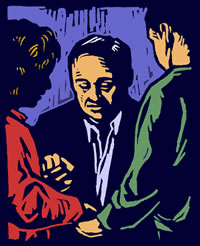
23rd Sunday in Ordinary Time Year A
Today’s gospel reading from Matthew comes from a collection of Jesus’ teachings applicable to life within the community of the Church, as it awaits the coming of the final Kingdom. In the passages that precede this one, Jesus has warned against arrogance on the part of those called to be leaders: ‘the one who makes himself as little as this child is the greatest’; he has pronounced a terrible judgment on those who lead astray ‘these little ones who have faith’. Matthew also includes here the parable of the lost sheep, as indicating the generous zeal that should be shown by leaders in the community. This reference to those who have gone astray leads into today’s reading. It describes the manner in which these people are to be dealt with within the Church community. Clearly, the community Matthew is writing for has developed procedures to be followed in such cases, and they see themselves as acting in accordance with the Lord’s own mind. When we recall the authoritative spirit that was taken for granted by those with leadership roles in the ancient world, we recognise how the listening and dialogue of these procedures reflect the fraternal love that was taught by Jesus - and recalled by Paul in our second reading.
In these procedures, we see the origins of the sacrament of reconciliation that is an essential part of the life of the Church during its time of pilgrimage. It was not a question of some private offence committed against the one who admonishes the wrongdoer. In referring to the need for ‘two or three witnesses to sustain the charge’, this procedure echoes the community’s Jewish background, citing a prescription of the Old Testament (Deut 19:15), thus making it clear that it is a question of serious and public faults. When these procedures, calling the wrongdoer to conversion, have failed, this person is to be ‘excommunicated’ - excluded from the community. We know from comments of St Paul concerning such cases, that this exclusion aimed to help the wrongdoer find forgiveness: ‘Do not treat them as enemies, but warn them as believers’, Paul writes (2 Thess3; cf. 1 Cor 5). Being welcomed back to share in the life of the community – especially the Eucharist – was the sacramental sign of reconciliation with God. Note that Matthew follows these procedural instructions with a second reference, in his gospel, to the power to ‘bind and loose’ in God’s name. This time it is given to the Church community, acting through the ministry of those who carry on the leadership role of the apostles. As we said, the sacramental sign of reconciliation with the Lord is being received back into the Church community.
‘The Son of Man has power to forgive sins’, Jesus declared (Mk 2:10). The reconciliation available in the life of the Church is the reconciliation he brings to the world. The words with which our reading ends, though brief, have immense importance for us, as we seek to understand and enter more fully into the mystery of the Church’s common life. You come together ‘in my name’, Jesus tells us. In the biblical tradition, these words have a great depth of meaning: they imply our identification with the Lord through our baptism, and to the fact that he continues to be present in the world of our time through our coming together as his Church and celebrating the Church’s common life. They also remind us of the Saviour’s presence in the public prayer of the Church, uniting our prayers with his, as he intercedes for the world before the Father.
John Thornhill sm

